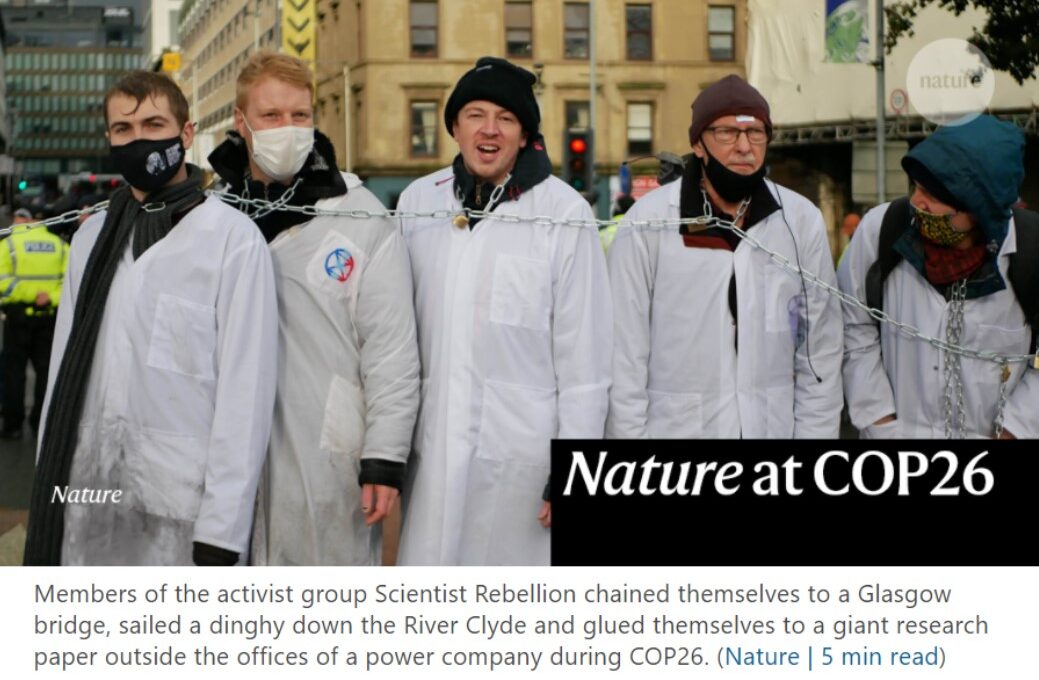Nature
November 13th, 2021
The leaders of almost 200 countries have reached a consensus at COP26. The name of the final deal is the Glasgow Climate Pact. For some, it is a breakthrough, albeit an imperfect one. “We all know that old adage, you can’t let perfect be the enemy of the good,” said US climate enjoy John Kerry earlier today. For others, the agreement is woefully inadequate.
Key phrases to look out for include “accelerating efforts towards the phase-down of unabated coal power and inefficient fossil fuel subsidies”. These are the first explicit mentions of coal and fossil fuels in a UN climate agreement. But the words ‘unabated’ and ‘inefficient’ are a controversial nod to those countries whose economies currently rely on those resources — or who feel they are essential to move their people out of poverty.
Several countries spoke out against the last-second change, spearheaded by India, to change the phrase “phase-out” to “phase-down”. The swap removes “one of the bright spots” of the agreement, said Marshall Islands representative Tina Stege. Nevertheless, they accepted the alteration in a bid to finalize the process.
“We all know that European wealth was built on coal. And if we don’t get rid of coal, European death will also be built on coal,” said Frans Timmermans, vice president of the European Commission. “Having said all that… this should not stop us from deciding today on what… is a historic, historic decision.”
“We all know that European wealth was built on coal. And if we don’t get rid of coal, European death will also be built on coal,” said Frans Timmermans
Crucially, countries promised to “revisit and strengthen” their 2020 climate goals by the end of 2022. They also expressed “deep regret” in the document about rich nations’ broken promise to give US$100 billion each year by 2020 to help less-wealthy regions adapt to climate change and mitigate further rises in temperature, and agreed to work out a new global adaptation goal in future talks.
COP26 President Alok Sharma was visibly emotional, and met with a standing ovation from delegates, as he brought down the gavel on this contentious and hard-fought agreement.
“This is the moment of truth for our planet, our children and our grandchildren,” said Sharma earlier today.
The outcome is “an important step, but it’s not enough”, wrote António Guterres, the Secretary-General of the United Nations. “It’s time to go into emergency mode. The climate battle is the fight of our lives and that fight must be won.”
Originally published at https://mailchi.mp.
Scientist Rebellion: researchers join protestors at COP26.
Scientists are among hundreds of demonstrators at the COP26 climate conference — and want more to join them.
Nature
Tosin Thompson
12 November 2021
It is about 1 p.m. on 11 November when I arrive at the rendezvous point: South Portland Street Suspension Bridge — a footbridge above the River Clyde in Glasgow, UK. On a dinghy floating across the river, a distant figure in a lab coat holds up a banner that reads “Tell the truth or we will lose everything”.
It is Tim Hewlett, an astrophysicist and co-founder of activist group Scientist Rebellion. I am told that he will continue to float across the river until he docks by the Scottish Event Campus where the 26th United Nations Climate Change Conference of the Parties (COP26) is taking place, or until he’s arrested — whichever comes first.
For the past week, I have been speaking to scientists at COP26, where nations are trying to agree on how to fulfil their pledges to tackle climate change.
Some researchers are advisers at the meeting or part of the delegations trying to negotiate a final deal.
But others are among the hundreds of activists staging protests on the streets of Glasgow throughout the summit to demand stronger action.
Chained together
Scientist Rebellion has carried out various activities during COP26. On 6 November, activists blocked King George V bridge, one of the Glasgow’s main routes connecting to the south side of the city.
They chained padlocks around their necks and to each other to form a line. Hours of chain-cutting later, the police arrested 21 people — including 15 scientists, according to Scientist Rebellion.
“We believe this is the first ever mass arrest of scientists over the climate crisis,” says Charlie Gardner, a conservation biologist at the University of Kent in Canterbury, UK, who was among those arrested.
About six years ago, Gardner started teaching an undergraduate module on climate change. “That made me realize just how serious and impactful the climate crisis is for biodiversity,” he says.
Gardner transitioned his research to focus on climate-change ecology, and called on other academics to join civil disobedience movements, including in a 2019 paper in Nature Ecology & Evolution1.
Gardner says Scientist Rebellion’s aim at COP26 is to highlight failures of the UN Framework Convention on Climate Change.
He adds that he is not impressed with the COP26 climate pledges that have been made so far, and that money and lobbying from sectors including the fossil fuel industry have too much sway over governments. “There are a lot of very powerful vested interests that do not want us to rapidly decarbonize as that will limit their ability to make profit.”
Some members of Scientist Rebellion even glued research papers describing the scale of climate change to a building. Among them was Kyle Topfer, an environmental scientist from Sydney, Australia, who also glued his left hand to a Frontiers in Conservation Science paper. Topfer was eventually arrested — still stuck to the paper — and taken away in a police van.
Not getting involved
It has been difficult for scientists to persuade their peers to join in with protests, says Caroline Vincent, an independent consultant for the pharmaceutical industry who is a member of XR Scientists — a branch of the organization Extinction Rebellion, which is known for disruptive protests.
“A lot of people in academia fear about their jobs because some institutions and universities frown upon people who engage in activism,” Vincent adds. “It’s ingrained in scientists to report in an impartial way and not take a view, a little bit like the Queen.”
But Gardner thinks many scientists are put off protesting because “they’re just too busy”. Senior academics have high workloads and are under constant pressure to publish and secure grants, he says. And early or mid-career researchers don’t want to get involved in activism because they have to concentrate on their research and publications. “To them I say there are no professorships on a dead planet,” Gardner says. “All our hopes for the future are in jeopardy now unless we take emergency action over the next few years.”
Although there are still relatively few scientists taking to the streets, Gardner has noticed a lot more discussions, particularly online, about the role of academics in going beyond teaching and research to engaging in advocacy and activism. He hopes that this will be followed by more involvement in movements such as Scientist Rebellion.
“Climate change isn’t just a battle of information, but of power and influence,” says Gardner. “Writing scientific papers doesn’t influence the public or governments, whereas activism might”.
Despite his arrest, he intends to carry on protesting with Scientist Rebellion and hopes to persuade more researchers to join him. “Leading by example is one of the most powerful ways to influence others,” he says.
Originally published at https://www.nature.com












